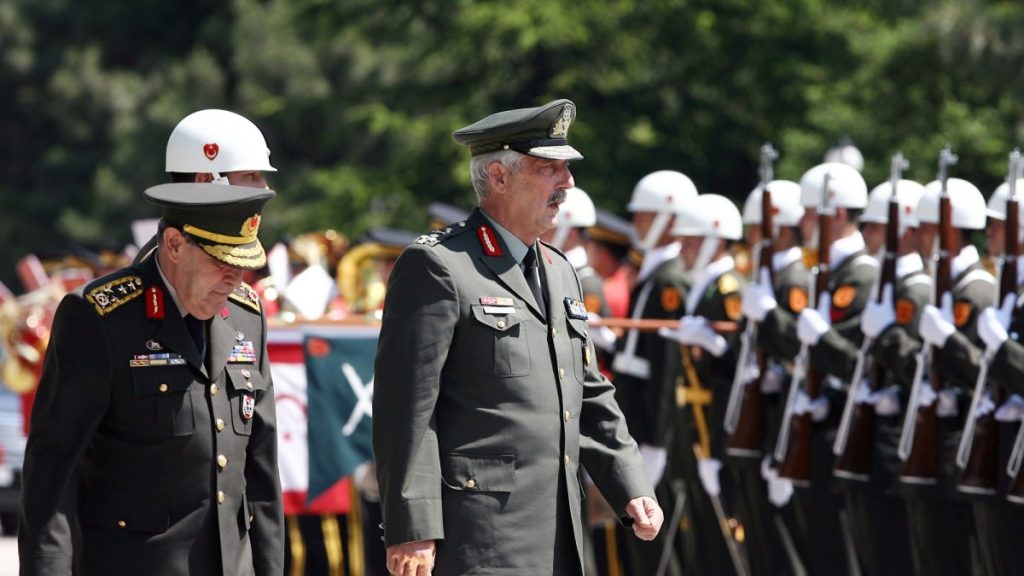Top figures of the ruling Justice and Development Party (AK Party), which weathered several attempts to overthrow the government, came to the defense of democracy on the anniversary of a 2007 military memorandum.
The “E-memorandum,” as it came to be known, was a stern warning to the government issued online on April 27, 2007, by the powerful military. It is regarded as a thinly veiled coup attempt, distinct from earlier coups only in its form.
“It is the anniversary of a memorandum buried deep in the annals of history thanks to the resistance of Mr. Recep Tayyip Erdoğan and the will of the government,” AK Party’s acting chair, Efkan Ala, said in a social media post on Sunday.
The memorandum, released at 11:20 p.m. on April 27, 2007, the first round of presidential elections, was an attempt to stop Parliament’s vote for presidential candidate Abdullah Gül.
According to the memorandum, exclusively published online, the army was concerned about the “erosion of basic values, primarily secularism,” and tied the activities of the conservative population permitted by the government, such as the recitation of the Quran at public events, to mark national holidays, to a reactionary movement “against the state.”
The statement targeted Gül, viewed as “reactionary,” a derogatory term secular extremists use for anyone with a conservative background. Indeed, it was not different than the motive of the 1997 coup for the army, which has long promoted itself as a self-styled defender of “secularism,” a concept exploited to stamp out the participation of practicing Muslims in social life, for instance, joining the public sector or pursuing political office.
Türkiye was heading to presidential elections with Gül as a potential ruling Justice and Development Party (AK Party) candidate long before the memorandum. Gül was a controversial figure for secularists due to his background. Even his status as the husband of a headscarf-wearing woman was a point of contention for secular extremists. For them, having such a man in the republic’s highest office was unprecedented and against their rigid interpretation of secularism. Then-Chief of General Staff Yaşar Büyükanıt openly voiced the army’s opposition to the next president when he said that the president should be “truly adhering to (the values) of the republic,” on April 12, 2007, to the chagrin of the government.
“Republic” rallies, where crowds of hardline secularists convened in big cities, followed Büyükanıt’s controversial remarks in the following days. The pressure was on the Erdoğan-led government, which did not step back from the nomination of Gül. In the first round of the election, Gül won 357 out of 361 votes in Parliament, while the opposition Republican People’s Party (CHP) objected to the result. The CHP took the election to the Constitutional Court, claiming that the president should win 367 votes or a majority under an interpretation of a constitutional article.
The Constitutional Court annulled the first round of elections upon appeal by the CHP on May 1. The AK Party then proposed a parliamentary election on July 22. Constitutional amendments followed the proposal. After the AK Party’s victory in the elections, Gül once again ran for election in an Aug. 20 vote, and at the end of a three-round election, he was elected as the 11th president of Türkiye on Aug. 28.
It took four years for the memorandum to be removed from the website and five years to launch an investigation against Büyükanıt. Büyükanıt died in 2019 before the inquiry reached the trial stage, and the case was closed.
On Sunday and Monday, the AK Party was scheduled to hold a series of events to highlight its stand against the memorandum. The party’s deputy chair, Hasan Basri Yalçın, told Anadolu Agency (AA) that he would moderate a panel entitled “April 27: Fight Against Junta and Coup” at the headquarters of the party in the capital Ankara on Monday and will host former Parliament Speakers Cemil Çiçek and Mehmet Ali Şahin at the event.
“We want to remind our society, through both social media and conventional media, what the e-memorandum was and how the AK Party fought against it.”
“Those who accused us of ‘coup plotting’ were, at the time, working alongside military tutelage to overthrow our democratically elected government,” he said, in reference to the main opposition Republican People’s Party (CHP), which claimed President Erdoğan was a junta leader.
“In every coup in the history of the Republic of Türkiye, the CHP has been either inside, around, leading or backing the coups. Among those who supported the April 27 e-memorandum were also members of the CHP. Therefore, we will show Turkish society once again that we will never accept accusations of ‘coup plotting’ against our party.”
Yalçın accused the CHP of politicizing the issue and attempting to cover up its own corruption scandals.
“Through these events, we must show that the April 27 e-memorandum was an intervention against democracy, that thanks to the AK Party’s firm stance, the memorandum was shelved, and that this marked the beginning of our efforts to democratize the country and push military influence back to its rightful place in democratic life. Citizens must know that the CHP has never truly stood for democracy and the rule of law, but instead has consistently aligned itself with coup plotters. We must repeatedly highlight this, especially for the younger generations who did not live through that era.”


